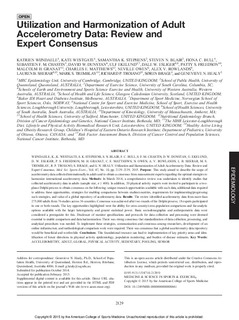Utilization and harmonization of adult accelerometry data: review and expert consensus.
Wijndaele, Katrien; Westgate, Kate; Stephens, Samantha K.; Blair, Steven N.; Bull, Fiona C.; Chastin, Sebastien F. M.; Dunstan, David W.; Ekelund, Ulf; Esliger, Dale W.; Freedson, Patty S.; Granat, Malcolm H.; Matthews, Charles E.; Owen, Neville; Rowlands, Alex V.; Sherar, Lauren B.; Tremblay, Mark S.; Troiano, Richard P.; Brage, Søren; Healy, Genevieve N.
Journal article, Peer reviewed
Permanent lenke
http://hdl.handle.net/11250/2384215Utgivelsesdato
2015-10Metadata
Vis full innførselSamlinger
- Artikler / Articles [2119]
Originalversjon
Medicine & Science in Sports & Exercise. 2015, 47, 2129–2139. 10.1249/MSS.0000000000000661Sammendrag
Purpose: This study aimed to describe the scope of accelerometry data collected internationally in adults and to obtain a consensus from measurement experts regarding the optimal strategies to harmonize international accelerometry data.
Methods: In March 2014, a comprehensive review was undertaken to identify studies that collected accelerometry data in adults (sample size, n >= 400). In addition, 20 physical activity experts were invited to participate in a two-phase Delphi process to obtain consensus on the following: unique research opportunities available with such data, additional data required to address these opportunities, strategies for enabling comparisons between studies/countries, requirements for implementing/progressing such strategies, and value of a global repository of accelerometry data.
Results: The review identified accelerometry data from more than 275,000 adults from 76 studies across 36 countries. Consensus was achieved after two rounds of the Delphi process; 18 experts participated in one or both rounds. The key opportunities highlighted were the ability for cross-country/cross-population comparisons and the analytic options available with the larger heterogeneity and greater statistical power. Basic sociodemographic and anthropometric data were considered a prerequisite for this. Disclosure of monitor specifications and protocols for data collection and processing were deemed essential to enable comparison and data harmonization. There was strong consensus that standardization of data collection, processing, and analytical procedures was needed. To implement these strategies, communication and consensus among researchers, development of an online infrastructure, and methodological comparison work were required. There was consensus that a global accelerometry data repository would be beneficial and worthwhile.
Conclusions: This foundational resource can lead to implementation of key priority areas and identification of future directions in physical activity epidemiology, population monitoring, and burden of disease estimates.
Beskrivelse
This is an Open Access article distributed in accordance with the Creative Commons Attribution Non Commercial (CC BY-NC 4.0) license, which permits others to distribute, remix, adapt, build upon this work non-commercially, and license their derivative works on different terms, provided the original work is properly cited and the use is non-commercial. See: http://creativecommons.org/licenses/by-nc/4.0/
